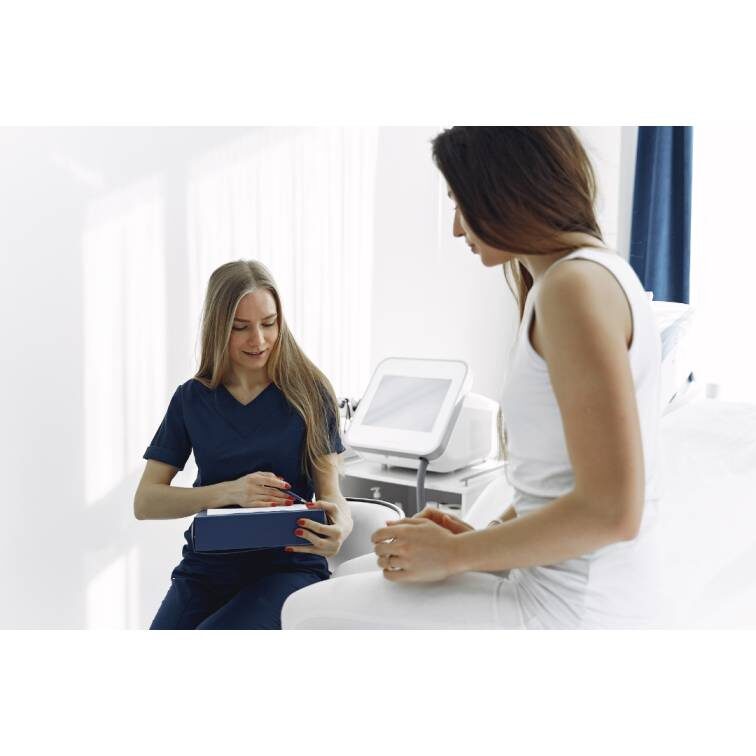Fertility Evaluation

Fertility Evaluation
In India, there is an approximate sub-fertility for 1 in 7 to 10 couples. It is a common issue in up to 85-90 percent of couples with identifiable male and female causes. Male causes lead to approximately 30-35% of cases of infertility. In 15-20 percent of couples, both male and female factors coexist. Female causes such as inadequate ovarian reserve, ovulation problems, fallopian tubes problems, endometriosis, PCOS, etc. are responsible for the rest.
Why is it done ?
Within a year, about 85% of healthy couples achieve pregnancy by unprotected intercourse. Couples that have been unable to conceive for more than a year must be evaluated for medical problems that could be interfering with their ability to conceive. Via a thorough clinical examination, scans, and laboratory testing, a specialist will assess a couple to look for underlying issues.
Some patients have an easy time conceiving (getting pregnant), but the pregnancy may get terminated due to an underlying medical condition. In such cases, a fertility specialist uses a comprehensive clinical history, ultrasound scans, and laboratory tests to try to determine the underlying medical condition.
Once a diagnosis has been made, a fertility specialist may determine the best treatment option for a given couple. This may include medical care for underlying diseases, surgery for conditions like fibroids or adhesions, and advanced fertility treatments like ovulation induction-timed intercourse (OI-TI), intrauterine insemination, or assisted reproductive techniques (commonly known as IVF treatment).

How do you Prepare ?
Male and female partners are evaluated during the diagnosis and treatment of fertility. Whenever necessary, it is recommended to visit the doctor together for best results.
Although your medical records provide a wealth of vital details for your fertility specialist, they only provide a partial view. Your own memories and evidence are also important. Prior to your visit, take some time to jot down and arrange the following details.
Via a comprehensive medical history and review of the previous medical records, your fertility doctor will gain insight into your condition. Please arrange the following data to assist the specialist in making a diagnosis.
- Carry your past medical history and, if available, laboratory test results.
- Indicate whether you take any medicines, vitamins, herbs, or other supplements. Include the dosage and frequency at which you take them.
- Any medical problems you or your partner may be suffering from.
- Previous fertility tests or treatments, if applicable
- Age of first menstruation. Specifics about your cycle. Is it normal? How long is your typical menstrual cycle? Is the flow unusually strong/weak? Do you suffer from premenstrual syndrome or particularly painful periods?
- How long you have been actively trying to coneive ? Intercourse frequency.
- Any members of your family who have had difficulty conceiving
- It is recommended that you dress comfortably on the day of the appointment, as you might be required to undergo a gynaecological examination and ultrasound scan.
Do not be afraid or hesitant to discuss any issues or concerns you might have with your professional.
Numerous procedures used to evaluate fertility must be timed to coincide with the menstrual cycle. It is recommended that you visit a fertility specialist prior to the anticipated start of your cycles
What you can expect?
First Visit:
The fertility specialist will speak with you to gain a better understanding of your problem. A gynaecology exam and an ultrasound scan to visualise the ovaries, uterus, and fallopian tubes may be recommended by the specialist. In most cases, the procedures are painless and cause little to no discomfort. Laboratory assessments for you and your partner may be recommended by the specialist. The following are some of the most commonly recommended tests:
- Male Fertility Tests: Tests for diabetes, thyroid disorders, liver or kidney disorders, complete blood count, hormones, infection tests, and semen analysis
- Female Fertlity Tests for ovarian reserve, normal ovulatory function, hormones, diabetes, autoimmunity, thyroid disorders, blood counts, etc.
The majority of assessments can be completed at any time. Glucose and homocysteine tests, for example, must be performed after an 8-10 hour fast. Hormones including folic acid stimulating hormone (FSH), luteinizing hormone (LH), and estradiol (E2) must be tested on particular days of the menstrual cycle. As required, your doctor or attending assistant will provide you with the necessary information.
Follow Up Visit:
The specialist will review the tests, discuss the diagnosis (nature of the issue identified) and treatment options with you and your partner. The specialist will enable you and your partner to make a decision about the future course of your treatment by answering your queries.
Result/Post Procedure
You’d have to make a decision regarding the further course of action based on the medical advice you’ve received. The next step may be Lifestyle changes, such as losing or adding weight, dietary changes, a decrease in smoking or alcohol intake, relaxation strategies, and so on. Control of co-existing medical conditions such as diabetes, hormone imbalances, poor sperm counts etc Additional diagnosis and management of gynaecological disorders such as fibroids, endometriosis, uterine anomalies, and so on.
- Ovulation indication– Timed intercourse– A procedure in which a doctor prescribes medications that stimulate ovulation and advises you on the best time to have intercourse in order to increase the chances of pregnancy.
- Intrauterine Insemination (IUI) – A procedure in which a doctor stimulates the ovaries with medications to assist patients in ovulating. T he sperms will be washed, processed, and placed in the uterus to increase the chances of conception.
- IVF/ICSI– A process in which a specialist obtains several eggs by stimulating the ovaries and sperm to form embryos in the laboratory. The embryos are grown in the laboratory for 3-5 days before being introduced back into the uterus.
Start your Parenthood Journey with Goodwill IVF
We have highly experienced team of fertility experts, including obstetricians and gynecologists, pediatricians, embryologists, andrologists, ultrasonologists, counselors, nurses, and other healthcare professionals always dedicated to help you.
Goodwill IVF
- A Unit of Neha Hospital, Changuvetty Kundu, Kottakkal, Kerala 676503
- Phone: +91 80897 13201
- Email: goodwillivf@gmail.com